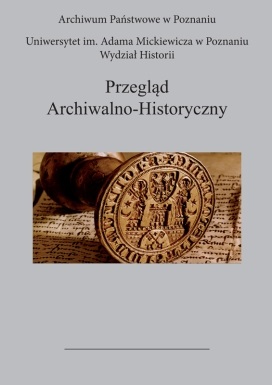
We kindly inform you that, as long as the subject affiliation of our 300.000+ articles is in progress, you might get unsufficient or no results on your third level or second level search. In this case, please broaden your search criteria.


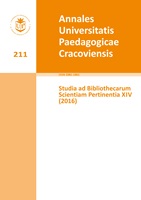
Review of: M. Czubińska, K. Podniesińska, Ekslibris polski: między herbem a obrazem, Muzeum Narodowe w Krakowie, Kraków 2016, s. 148.
More...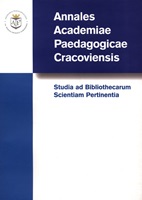
Two hundred years after the original edition of Kinder- und Hausmärchen (1812–1815) was published there is a possibility to ponder upon how books of the Brothers Grimm were edited in Poland. The review presents fairy tales in self-contained issues in periods: 1895–1939, 1939–1945, 1945–1989, 1990–2011. The first book by Brothers Grimm in Poland was Baśnie dla dzieci i młodzieży (1895) translated by Cecylia Niewiadomska, edited by Gebethner & Wolff. A big number of single fairy tales were published in the years 1918–1939. After the Second World War the most popular collection of fairy tales by W. and J. Grimm was Baśnie translated by Marceli Tarnowski and edited by Nasza Księgarnia in 1956. Up to year 2000 it was reprinted 18 times! In 1982 Ludowa Spółdzielnia Wydawnicza published the first critical edition: Baśnie braci Grimm (transl. by Emilia Bielicka and Marceli Tarnowski, with afterword and comments by Helena Kapełuś) and in 2010 Media Rodzina published the first full version of W. and J. Grimm’s fairy tales: Baśnie dla dzieci i dla domu (translation and afterword by Eliza Pieciul-Karmińska). After 1989 we can observe “chains of books” – multiple adaptations and other editions “related to” those fairy tales. Mass culture and commercial aspects brought many variants of text and visual representations. Many of them have new authors. Presentday adaptations are – like in the 19th century – books for the youngest children, but sometimes they are also new fairy tales inspired by the plot (e.g. Bohdan Butenko’s book). In present times there are possibilities to familiarize children with the original text of the canonic fairy tales, but more and more often only specialists are interested in it.
More...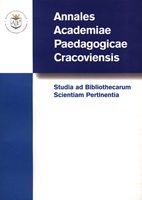
Like other institutions of this type in the old Polish period, the City Council of Lviv, the primary authority in the city, gathered its own book collection. It consisted of books as well as other bibliological documents, initially handwritten, then copied by using the typographic technique. Acquisition of essential books stemmed from the practical needs of the office as they served as reference collection. It included primarily legal books but also historical, astronomical, scientific and others. Apart from purchasing on the book market, books were rewritten on demand of the councilors. The collection also included books that were donated or dedicated to the city. The Council, which fulfilled the legislative, administrative and to some extent also the judiciary function, was also one of the few cultural centers in the city and a cultural patron. It can be assumed that at the end of the 17th century, apart from handwritten archival manuscripts, the library possessed over 100 books. It is hard to estimate the overall number of prints and other bibliological documents that passed through the Council over the time.
More...
The article presents a definition of documentation culture understood as the motivations, attitudes and behaviours of the authors and users of documentation that occur during its planned and effective creation, gathering, storing, compiling, and sharing by using methods and rules of complex management of documentation by means of tools, techniques and technologies that are available. The article points out that the notion of documentation culture is linked with the notion of the social information order which is an essential part of the social infrastructure of a country as well as supranational and international structures. It also points out that the notion does not have its stable place in the typology of cultures nor in the hierarchy of different categories of culture. The author shows the relation between documentation culture and the information culture, IT culture, organizational culture as well as material and spiritual culture. In the summary, the author states that documentation culture is the part of culture whose creations are passed to the next generations as cultural heritage.
More...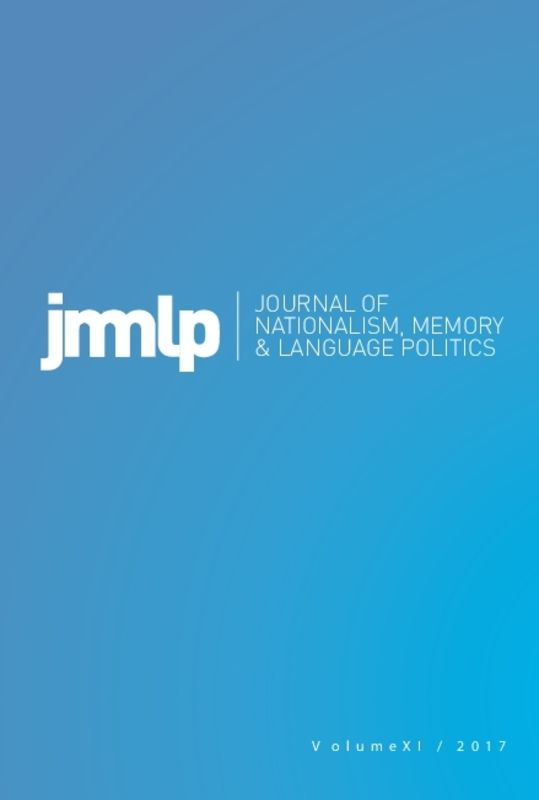
We analyze the coverage of the Gezi Park protests by two major Western newspapers—The New York Times and The Guardian—through the lens of media framing, rhetoric, and collective memory. We argue that these digital archives frame Turkey’s Gezi Park protests as a challenge to an authoritarian government by promoting the themes of unrest as a conflict of ideologies, oppression of citizens, and the park as a site of memory. In a concluding section, we focus on the significance of digital archives as repositories of collective memory and the role of media framing in shaping these reconstructions of events in the past.
More...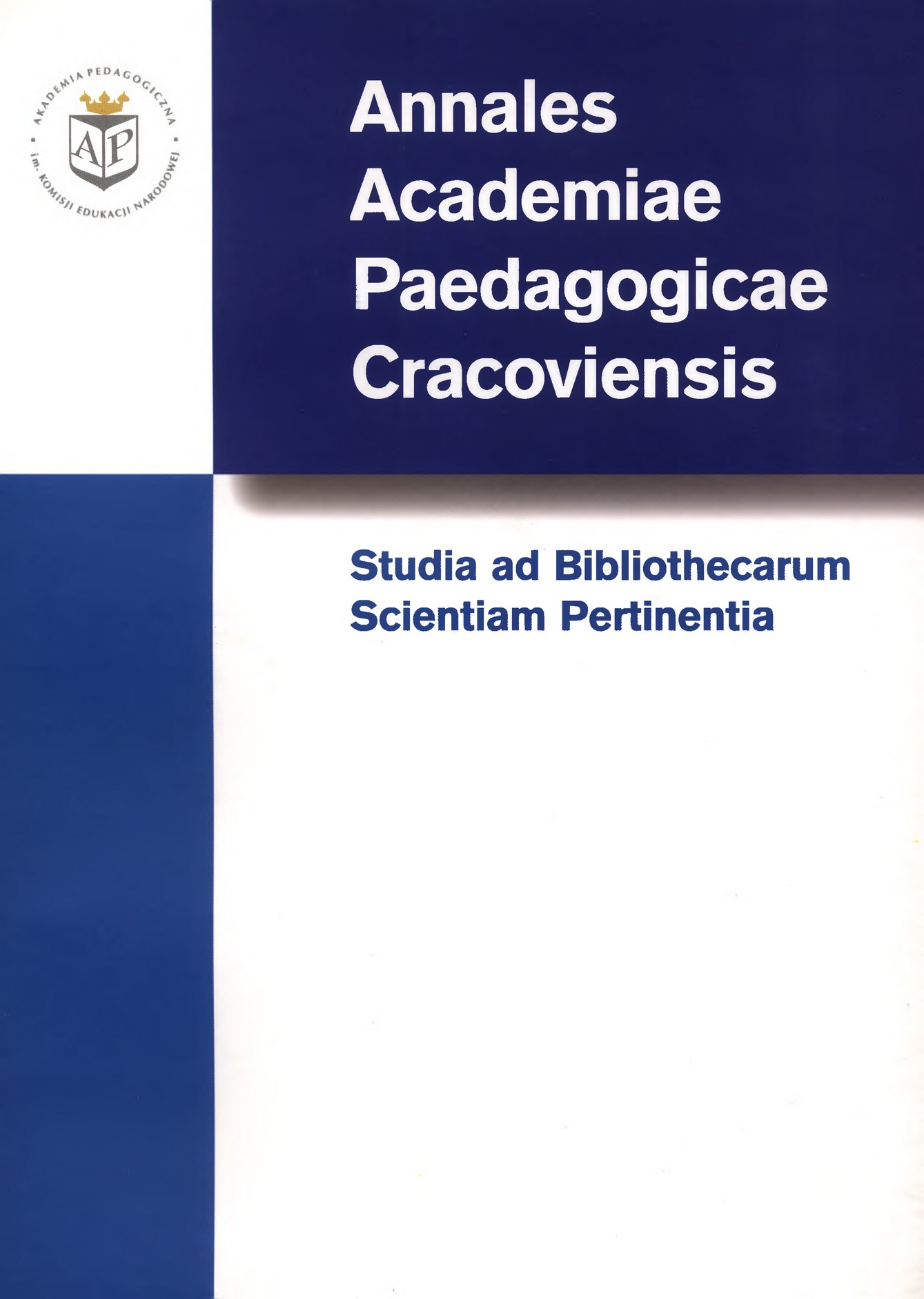
The Second General National Exhibition took place in Lviv in 1894. One of the exhibits was the library of counts Branicki from Sucha. The curator of the museum and library collections, Michał Żmigrodzki, prepared an album entitled The library of counts Branicki in Sucha, which outlined the history of the library and presented its structure and functioning. He noticed the richness of the collection, which at that time consisted of over 26 thousand books, including 22 incunabula, 683 sixteenth-century prints, 2246 of seventeenth-century volumes and 7000 eighteenth-century books. The album comprised 30 pages with drawings and photographs of the palace and the library chambers. Apart from the album, Żmigrodzki sent to the Exhibition the map of Sucha and its surroundings, the map of industrial centres of the area, and a miniature model of the palace with marked library chambers. The album and other exhibits from Sucha were to be displayed in the pavilion of counts Potocki from Krzeszowice. However, due to the fact that the transport had arrived in Lviv very late, they were not qualified for the Exhibition. Owing to Żmigrodzki’s efforts the album was presented six weeks after the opening of the Exhibition, in the pavilion for literature, journalism and reproductive art.
More...
This article presents the history of the Wróblewski Library in Vilnius from the beginning of its existence to October 1939, i.e. the capture of the city by the Soviet army, when the occupational authorities decided to transport the most valuable part of the collection (concerning Vilnius, Lithuania, and Freemasonry) deep into the territory of the Soviet Union, in order to “protect it from the turmoil of war”. The fate of most of this collection is unknown until today. The history of the Library has been divided into three periods. The first one was the period when Tadeusz Wróblewski created his collection of books for his own use, still, with an idea to make it accessible to others at some point in the future. This period lasted from 1900 to 1912, when the Society of the E.E. Wróblewski Library was established; this organization was responsible for the maintenance of the collection and for rendering it accessible to the public. Setting up the Society marks the beginning of the second period of the Library’s history, in which the collection was handed over to the Society; in that time, however, T.Wróblewski directed the Library himself and maintained it financially. This lasted till his death in 1925. Then the Library entered the third, crucial period of its history, which lasted until 1939. In these years the Library thrived, functioning as a regional library, and became the seventh greatest state-governed library in the whole country. The author of the article also points to the necessity of further research into the history of the Library, especially into the questions of its fate during the World War II and afterwards.
More...
This article presents the archival materials concerning Adam Mickiewicz that have been stored until today in libraries and archives of Vilnius. They relate to the period of Mickiewicz’s studies in Seminarium dla Kandydatów do Stanu Nauczycielskiego (Teacher Trainees Seminar), at first in the Department of Sciences, and from the second year of studies in the Department of Literature and Liberal Arts of the Imperial University of Vilnius. Some of these documents were found in the legacy of Michał Pełka-Poliński, a professor of mathematics and a loyal imperial civil servant, who was the liquidator of the University in 1832. PełkaPoliński’s legacy was described by Wiesław Mincer in 1960s. His postulate was to work on Poliński’s memoirs in the first place (cf. Spuścizna rękopiśmiennicza Michała Pełki-Polińskiego, Zeszyty Naukowe Uniwersytetu Mikołaja Kopernika w Toruniu, Nauki HumanistycznoSpołeczne, vol. 13 (1965), pp. 43–52). His suggestion was eventually realized in a work by the author of this paper, Matematyka wileńska za czasów Adama Mickiewicza. (Mathematics in Vilnius in the times of Adam Mickiewicz) Personalia, “Wiadomości Matematyczne” vol. 39 (2003). In Poliński’s files the author encountered a previously unknown document concerning Adam Mickiewicz (a certificate of being awarded by the rector, Szymon Malewski), as well as other unknown documents concerning Jędrzej Śniadecki. In another collection of archival materials, certain documents were discovered that are related to Mickiewicz’s work at school in Kaunas and to his health leave.
More...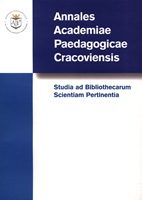
The outlaying and publishing activity in 19th century is frequently the subject of library scientific studies, and still there are many things worth researching. The present study is an attempt at presenting the activities of provincial outlayers and publishers in Eastern Galicia in 1861-1893. A significant growth of their production occurred during the years of autonomy, when the provincial towns became decidedly more active. During the studied period, 873 publications in 903 volumes and 57 periodicals were produced in Eastern Galicia. The greatest contribution to the typographic production was made by Przemyśl, Kołomyja, and Tarnopol (over 100 items). In the process of the analysis, it was noticed that the most prolific publisher of that time was Józef Pawłowski, operating in Tarnopol, who published 81 books. Michał Biłous, a publisher from Kołomyja, had an equally large production. Large contribution to the publishing activity was made also by Jan Rosenheim and Feliks West in Brody, Ozjasz Zukerkandel in Złoczów, and Jan Czaiński in Sambor. The repertoire of the provincial publishing houses included mostly belles letters, as well as educational, occasional, and religious literature. When studying the printings from the formal perspective, one has to admit that all of the publishers paid attention to good quality of their publications. The analysis of the production of provincial publishers made it possible to determine and evaluate the considerable contribution of the publishing centres of the province of Eastern Galicia to the development of the national culture and readership in the country in the second half of 19th century.
More...
The oldest pedagogical university in Poland is preparing its 60-year jubilee (1946-2006). Over 100 thousand students graduated from this school during that time. About three thousand staff members of the school worked to educate them. The teachers were busy with didactic and scholarly work, school administration, organization of the teaching and learning processes. The whole functioning of the school has been - and still is - documented by the ever growing volume of archival materials. Some of them have a historic value, and as such they are stored “for ever”. Among those documents are the materials related to “Pedagogium” (1928-1946), i.e. the semi-higher education school headed by Dr Henryk Rowid. In Septem-ber 1946, on the basis of its material assets, the 3-year State Pedagogical School of Higher Education was established. Since that time, 12 Rectors headed this expanding school. In 1973, the school was given the honourable name of the National Education Commission. Organized in 1959, the archives of the school collect all documentation connected with its own development embedded in the fate of the Polish educational system. 12 successive workers of the archives organized the collection which comprises about 500 thousand docu-ments. The collection occupies shelves that are 2500 metres long. During one year of its operation, the school’s administration hands over to the archives even as much as 70 metres of documentation. On the basis of this collection, the Academic Publishing House of the Peda-gogical University has published a selection of the 523 most important documents from 1946 to 1996. Three volumes of sources and eight “book” studies of the history of the school present its life during the past 50 years. Another great monograph of the 60 years of the University is currently being prepared. The Archives of the Pedagogical Academy by the name of the National Education Commis-sion is also contributing to this work.
More...
The publishing activity emerged from University’s statutory tasks whereas amount and publishing level stayed in close dependence on the original institution’s development. In the present study the serial publishing of the scientific type were discussed showing in the tables and graphs the development dynamism of the particular series and thematic sub-series. The time censorship was marked by the beginning of the publishing activity in the 1954 and gain-ing the status of the University in 1999 that finished the old series and began the new series of the changed titles.
More...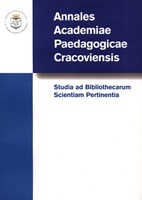
Ze Staszkiem spotkałem się u początków swej uniwersyteckiej edukacji w pierwszych dniach września 1952 roku w tzw. Gołębniku. Nie był liczny nasz rocznik – niespełna 100 osób rekrutujących się z całej Polski. Choć dominowały osoby – rzecz zrozumiała – z Krakowa, Małopolski, Podkarpacia. Na ćwiczeniach, seminariach w jednej ławie siedzieliśmy ze Staszkiem. Od pierwszych tygodni należał do grona tych, o których zwykło się mówić: primus inter pares. Imponował nam swoim oczytaniem, on wszystko wiedział wcześniej. Kiedy poznawaliśmy gmach Biblioteki Jagiellońskiej i sztukę posługiwania się katalogami, Staszek był tam już zadomowiony i zaprzyjaźniony z bibliotekarz d rozblio ami.
More...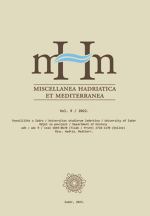
The manuscript collection known as the “Collection of the Bisantis Family” kept in the Archives of the Croatian Academy of Sciences and Arts in Zagreb contains partially damaged transcripts of several documents from the second half of the 14th century, originating from the Kotor office. The document from July 1356 refers to the division of money between the sons of Tryphon Bucchia and regulating his debts. Documents from April 14th and July 27th, 1359 speak of property disputes between Doma Berislavi and Drago Basilius, son of Mathaeus. The document of March 20th, 1362 deals with the issue of marriage and marital property. The document from January 6th, 1371, concerns the assignment of the right to the property that the Venetian Philippo Barelli acquired in Kotor.
More...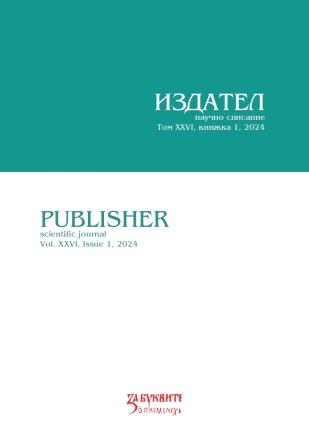
This paper aims to present the research partnership project of francophone publishers’ archives, which made the platform possible. This project gathered archivists and researchers from various institutions (universities, archives centers, publishers’ associations) and various regions (Belgium,Canada, France, Switzerland) in the francophone world, with the main objectives to advance and to study archives of the publishing world. The article focuses on the birth of the partnership project, on the internet platform Archives éditoriales, and on other outcomes of the project. It also addresses the questions of why, how and when publishing houses tend to donate their archives to public institutions.
More...
This article, for the first time in Russian historiography, reconstructs the biography of Vladimir Ivanovich Savva (1865–1920), an esteemed Russian historian and archivist, based on the analysis of historical writings, meeting minutes from scientific societies, as well as letters and memoirs from his contemporaries. Researchers have long been captivated by his original path as a scholar, yet it has never been the focus of a dedicated study. Here, V.I. Savva’s biography and professional development are thoroughly explored. His works and archival research are discussed. The interactions he had with other prominent scholars during the turn of the 20th century are considered. It is the first article in a series that will document and examine V.I. Savva’s life and works on Russian history from the 16th to 19th centuries.
More...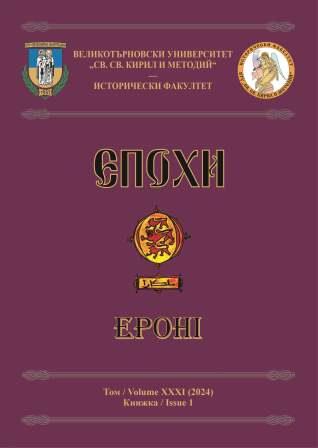
This publication is dedicated to the first contacts and to the beginning of the professional archival cooperation between the Bulgarian State Archives and the International Council on Archives (ICA). More specifically, the problem is examined in several aspects: background; foundation of the ICA; the holding of the first international archival congresses; the acceptance of the Bulgarian State Archives in the ICA as an institutional member of category “A”; the first Bulgarian participation in an international archival congress, respectively the Fourth International Congress of the ICA in Stockholm, Sweden (17–20 August 1960).
More...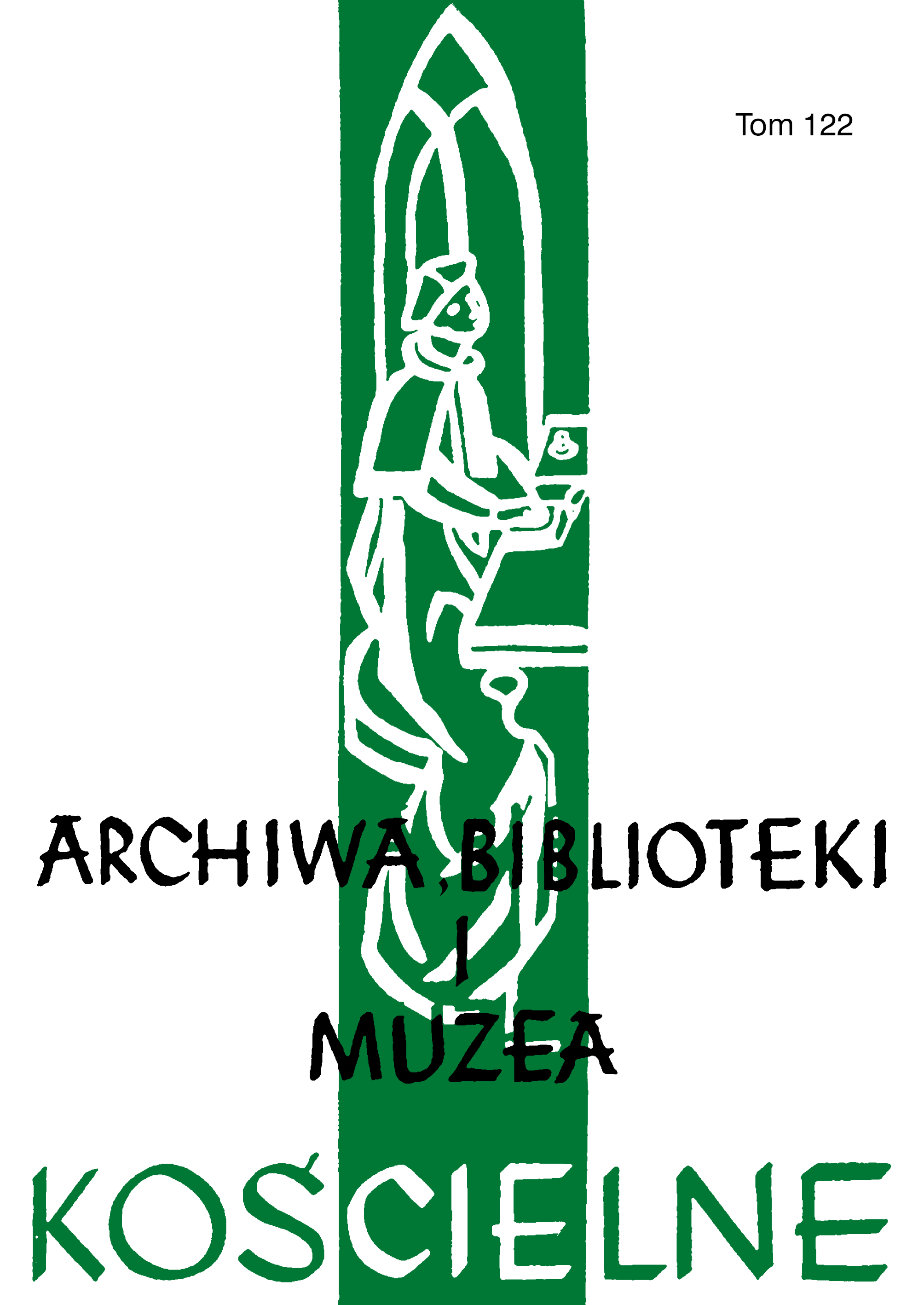
This article delves into the Neo-Union, a religious movement that emerged in interwar Poland starting from 1924, particularly gaining ground in the Volhynian Voivodeship by 1925. Its focus lies in analyzing the materials sourced from the security department of the Volhynian Voivodeship Office stored in the State Archives of Volyn Oblast (Lutsk, Ukraine), aiming to glean insights into the Neo-Union movement. The significance of this study is underscored by the dearth of scholarly exploration on this subject, as well as the limited research on the Neo-Union’s progression in Volhynia overall. Through the examination of archival materials, it becomes evident that while the fonds do not contain an extensive array of documents relevant to the history of Neo-Union, the ones present hold significant value. These materials encompass descriptions of Neo-Union parish development and evaluations of the movement by the voivodeship government and starosta offices. Particularly notable are documents vividly portraying the Neo-Union clergy, predominantly comprised of former Orthodox priests, who are deemed instrumental in the waning of the Neo-Union movement in Volhynia. Moreover, the qualitative study of individual Uniate parishes that emerged in the 1930s necessitates the utilization of documents from the aforementioned archival collection. These records provide indispensable insights into the dynamics and evolution of Neo-Unionism within the region.
More...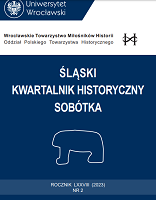
The article presents the short outline of history of public history in the USA and in Poland, referring to Barbara Franco’s definition that it is history for the public, by the public, with the public, and about the public. Emphasizing the role of the public, it focuses on these four aspects, addressing issues of the relationship between the past, the public and other stakeholders, and relating them to the ways of dealing with history that respond to changing external conditions, that take into account local specificities, but at the same time are a universal experience.
More...